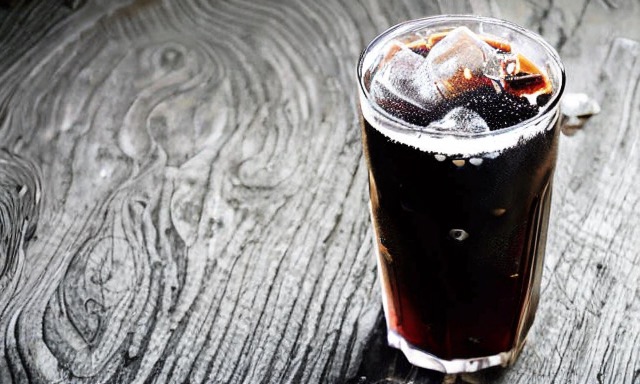Internet Asks: “Does Coke Zero Have Caffeine?”
Pop the cap, hear the fizz, and brace yourself for a delightful journey into the world of Coke Zero. This beloved beverage has captured the hearts of many soda enthusiasts with its iconic taste and zero sugar promise. But what about caffeine? Join us as we embark on a fizzy adventure to uncover the truth behind the caffeine content in Coke Zero!
sponsored links

The Coke Zero Experience
Coke Zero, with its distinctive black packaging and enticing flavor, has become a popular choice for those seeking a guilt-free soda experience. Designed to provide the classic Coca-Cola taste without the added sugar, Coke Zero has amassed a loyal fanbase around the globe. But what about caffeine? Does this zero-calorie beverage also provide a caffeine boost? If so, how much caffeine is in Coke Zero? Let's dive in and discover!
Unveiling the Caffeine Content
YES—Coke Zero contains caffeine, giving you that extra boost when you need it most. With approximately 34 milligrams of caffeine in a 12-ounce (355ml) can, Coke Zero offers a moderate dose of this invigorating stimulant. So, whether you're looking for a pick-me-up in the morning or a refreshing afternoon treat, Coke Zero can help keep you energized without the added sugar.
Nutritional Facts of Coke Zero
In addition to its caffeine content, let's explore the nutritional facts of Coke Zero. Here's what you can expect per 12-ounce (355 ml) serving:
- - Calories: 0
- - Total Fat: 0g
- - Sodium: 40mg
- - Total Carbohydrates: 0g
- - Total Sugars: 0g
- - Protein: 0g
Coke Zero is a great option for those who are mindful of their calorie and sugar intake, as it contains no calories, fat, carbohydrates, or sugars. It allows you to enjoy the satisfying taste of a cola without compromising your dietary goals.
sponsored links
Caffeine and Beyond: The Ingredients List
While caffeine plays a role in the unique Coke Zero experience, it's just one part of the beverage's carefully crafted formula. Here's a glimpse into the key ingredients that make up this fizzy delight:
- - Carbonated Water: The foundation of any soda, carbonated water provides that satisfying effervescence that tickles your taste buds.
- - Caramel Color: Responsible for Coke Zero's signature dark hue, caramel color adds depth to the visual appeal of this beverage.
- - Phosphoric Acid: This ingredient contributes to the tangy and slightly acidic taste that balances the sweetness.
- - Aspartame: A sugar substitute used to achieve the zero-sugar claim, aspartame provides the sweet notes without the extra calories.
- - Potassium Benzoate: A preservative that helps maintain the freshness and shelf life of Coke Zero.
- - Natural Flavors: A blend of secret natural flavors adds that unmistakable taste profile we all know and love.
Savoring Coke Zero Responsibly
While Coke Zero offers a refreshing and energizing experience, it's important to consume it in moderation and be mindful of your caffeine intake. Individual sensitivities to caffeine may vary, so listen to your body and consider your personal dietary needs. If you're particularly sensitive to caffeine or are watching your overall intake, you may want to limit your consumption of Coke Zero or opt for the caffeine-free alternatives available.
Conclusion
In the realm of zero-sugar sodas, Coke Zero stands tall, captivating taste buds with its unique blend of flavors and caffeine-infused goodness. With a moderate amount of caffeine, Coke Zero provides a refreshing boost without the guilt of added sugars. So, crack open a can, relish the effervescence, and enjoy the invigorating experience of Coke Zero. Cheers to a fizzy adventure that keeps you energized and delighted sip after sip!
Note: The nutritional facts provided are based on a 12-ounce (355 ml) serving of Coke Zero and may vary slightly depending on the region and packaging size. Always refer to the product label for the most accurate and up-to-date information.
sponsored links
References
- 1. Harvard School of Public Health. Caffeine. https://www.hsph.harvard.edu/nutritionsource/caffeine/
- 2. Coca Cola. Zero Coke. https://us.coca-cola.com/products/coca-cola-zero-sugar
- 3. Coca Cola Australia. FAQs. https://www.coca-colacompany.com/au/faqs/what-is-in-coca-cola-no-sugar-
- 4. Eczema. What is phosphoric acid in soda and its benefits?. https://www.echemi.com/cms/1079130.html
- 5. U.S. Food & Drug. Aspartame and Other Sweeteners in Food. https://www.fda.gov/food/food-additives-petitions/aspartame-and-other-sweeteners-food
- 6. WebMD.What to Know About Sodium Benzoate. https://www.webmd.com/diet/what-to-know-about-sodium-benzoate
- 7. Independent UK. Not quite the real thing: Coca-Cola's 'secret formula' is out of the bottle - but can the famous flavour be recreated at home?.https://www.independent.co.uk/news/world/americas/not-quite-the-real-thing-cocacola-s-secret-formula-is-out-of-the-bottle-but-can-the-famous-flavour-be-recreated-at-home-8621636.html
People are also reading...
Does Sprite Have Caffeine?
Calories In Steak?
Chicken Taco Calories?
Does Hot Chocolate Have Caffeine?
Are Carrots Acidic?
Are Mangoes Acidic?
Orange Juice pH?
Does Kahlua Have Caffeine?
Calories In a Grilled Cheese?
Is Watermelon Acidic?
6 oz Steak Calories?
Are Strawberries Acidic?
Ready to level-up?
Create meal plans 10x faster, follow up with your clients through our mobile app, and never struggle with meal planning or recipe management again.